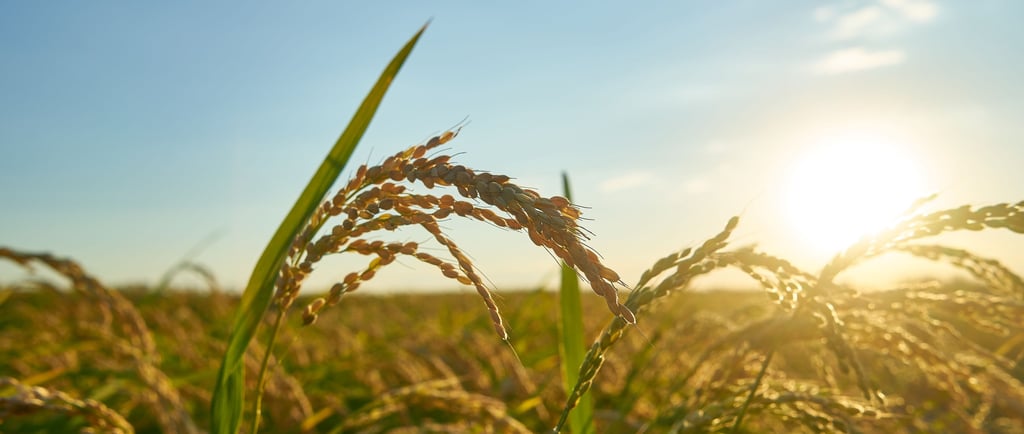Climate Change and Its Impact on Global Food Security
LIFESTYLE
9/29/20245 min read


Understanding Climate Change
Climate change refers to significant alterations in global temperature and weather patterns over time. While climate change can occur naturally, scientific consensus indicates that human activities, particularly the burning of fossil fuels, deforestation, and industrial processes, are the primary drivers of the current rapid changes. These activities increase the concentration of greenhouse gases (GHGs) in the atmosphere, such as carbon dioxide (CO2) and methane (CH4), which trap heat and lead to global warming.
The mechanism of climate change involves a feedback loop where increased GHG levels cause the Earth's average surface temperature to rise. As temperatures climb, changes in weather patterns become evident, contributing to phenomena such as extreme weather events, prolonged droughts, and intense storms. Such variabilities pose significant threats to environmental systems, disrupting ecosystems, diminishing biodiversity, and altering available resources like freshwater and arable land.
Moreover, the urgency of addressing climate change is underscored by increasing evidence from research conducted globally. Studies have shown that human-induced climate change is not a distant threat but a current reality that is already impacting the environment. The frequency and severity of climate-related disasters have escalated, highlighting the pressing need for mitigation strategies. Recognizing climate change as a crucial issue is paramount, as it lays the groundwork for understanding its broader implications, particularly in relation to global food security.
In addition, the implications of climate change extend beyond the immediate environmental impacts. Shifts in agricultural productivity, influenced by changing temperatures and precipitation patterns, threaten the stability of food systems globally. This intricate interrelationship between climate change and food availability necessitates a comprehensive understanding of the factors at play to effectively address the challenges ahead.
The Link Between Climate Change and Agriculture
Climate change has emerged as a significant threat to agricultural productivity, directly impacting food security worldwide. Rising temperatures, altered precipitation patterns, and the increasing frequency of extreme weather events are reshaping the agricultural landscape. These climatic shifts not only affect crop yields but also pose serious challenges to livestock health, ultimately jeopardizing the livelihoods of farmers and the stability of global food supply chains.
One of the most profound impacts of climate change on agriculture is the increase in average temperatures. Crops have specific temperature thresholds for optimal growth, and higher temperatures can lead to reduced yields. For instance, heat stress can cause crops to mature more rapidly, resulting in lower quantities of produce that may not be suitable for market. Likewise, livestock exposed to extreme heat may experience declines in fertility and milk production, ultimately affecting food availability.
Additionally, changes in precipitation patterns can disrupt the regularity of irrigation and rainfall patterns that many agricultural systems rely upon. Regions previously characterized by consistent rainfall may face periods of severe drought, resulting in water scarcity for irrigation and ultimately affecting crop health. Conversely, areas with increased rainfall may experience flooding, damaging crops and arable land. These extreme weather events can devastate entire harvests, leading to shortfalls that affect food prices and accessibility.
The ripple effects of these climate-related changes extend beyond individual farms. Farmers may face increased costs to adapt to new agronomic practices, and their inability to maintain productivity can lead to food shortages. As a result, food supply chains experience disruptions, impacting consumers globally. This interconnectedness highlights the importance of addressing climate change, not only for agricultural resilience but also for ensuring food security on a broader scale.
Food Security Challenges Arising from Climate Change
Climate change is undeniably one of the most pressing challenges facing global food security today. As average global temperatures rise, extreme weather events, such as droughts and flooding, become more frequent, leading to significant disruptions in food production. These disruptions can cause increased food scarcity, as crops fail and livestock production diminishes. One of the most concerning aspects of this situation is that the most vulnerable populations, particularly in developing countries, are often those who suffer the most; they rely heavily on agriculture for their livelihoods and food supply.
In addition to increased scarcity, climate change is also contributing to rising food prices. Fluctuations in weather patterns can drastically affect crop yields, leading to supply shortages that drive prices up. Households already struggling to make ends meet may find it increasingly difficult to afford basic food items, leading to a compounding effect where malnutrition rates rise in tandem with food prices. This predicament is particularly acute in low-income communities, where access to affordable and nutritious food is vital for maintaining health and wellbeing.
Moreover, as climatic conditions change, the geographical areas deemed suitable for food production also shift. Farmers may find traditional agricultural zones less viable, prompting a transition to new regions that may not be equipped with the necessary infrastructure or knowledge for optimal production. This realignment can disrupt local food systems, making it challenging for populations to access both adequate and nutritious food. Such shifts may further exacerbate inequalities, as wealthier nations may adapt more easily compared to poorer countries with limited resources.
Overall, the intricate relationship between climate change and food security highlights the urgent need for comprehensive strategies that support vulnerable populations and promote sustainable agricultural practices. Addressing these challenges will be essential in ensuring food security in an era defined by environmental uncertainties.
Strategies for Mitigating Impact and Enhancing Resilience
Addressing the pressing issue of climate change requires a multifaceted approach focused on mitigating its impact on global food security. One essential strategy involves the development of climate-resilient crops. These genetically bred or naturally selected crops can withstand the environmental stresses brought about by climate change, such as increased temperatures, drought, and flooding. By integrating advanced agricultural research and biotechnology, scientists and farmers can produce varieties that are not only resilient but also high-yielding, ensuring food availability in unstable climate conditions.
Sustainable farming practices are another critical adaptation measure. Techniques such as agroecology, crop rotation, and conservation tillage contribute to enhancing soil health and maintaining ecosystem balance. Implementing these methods can significantly improve the resilience of food systems against climatic fluctuations while promoting biodiversity. Additionally, educating farmers and reinforcing traditional knowledge regarding sustainable practices can facilitate better adaptation to changing weather patterns.
Policy approaches play a pivotal role in addressing climate-related food security challenges. International cooperation is essential for sharing knowledge, resources, and technologies. Policies fostering investment in agricultural technology (agritech) can drive innovation and efficiency across food systems. Governments, non-governmental organizations (NGOs), and the private sector must collaboratively develop policies that incentivize sustainable practices and support smallholder farmers in adapting to climate change's adverse effects.
It is also crucial to engage stakeholders at all levels to bolster resilience. Local communities should be encouraged to participate in decision-making processes regarding food system strategies, ensuring that their voices are heard. Raising awareness about the impacts of climate change and fostering a culture of resilience can empower individuals and communities to take proactive steps in tackling food security challenges.
Ultimately, a comprehensive approach that combines agricultural innovation, sustainable practices, and supportive policy frameworks will be essential to mitigate the adverse effects of climate change on global food security. By prioritizing these strategies, stakeholders can enhance resilience in food systems and safeguard the future of food availability for all.
